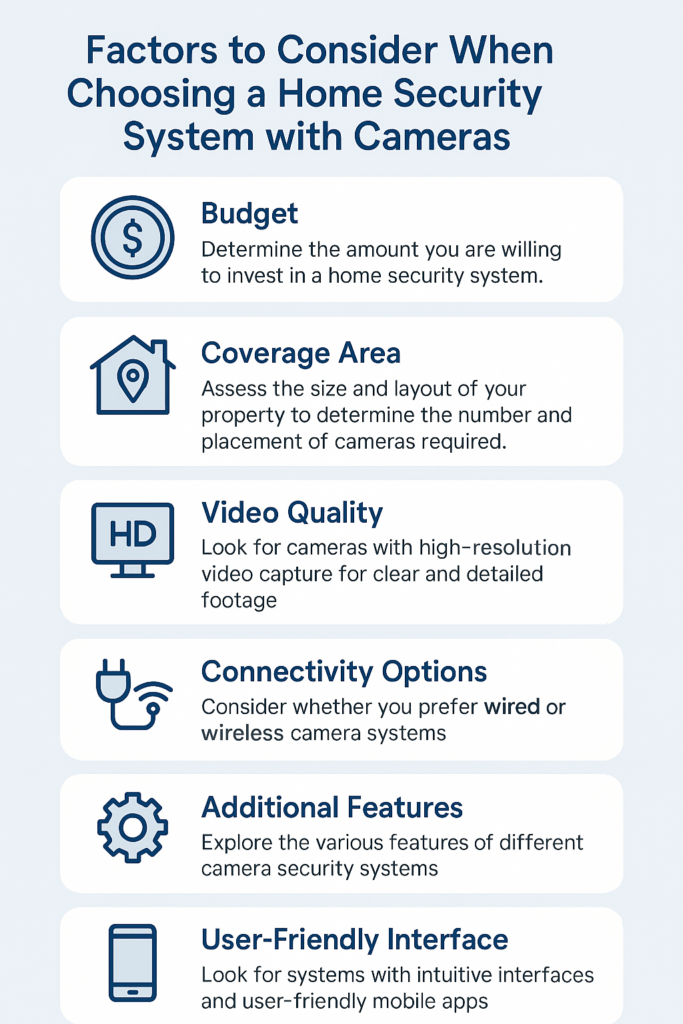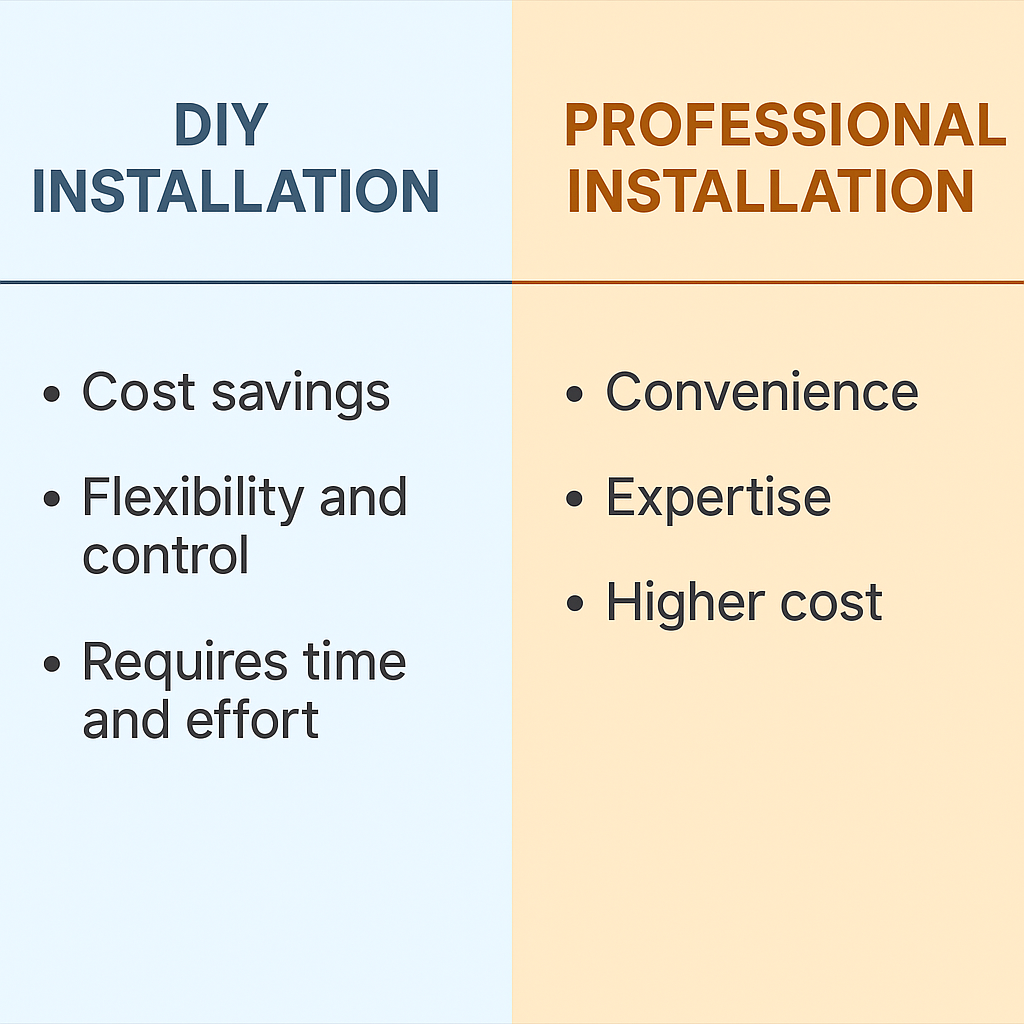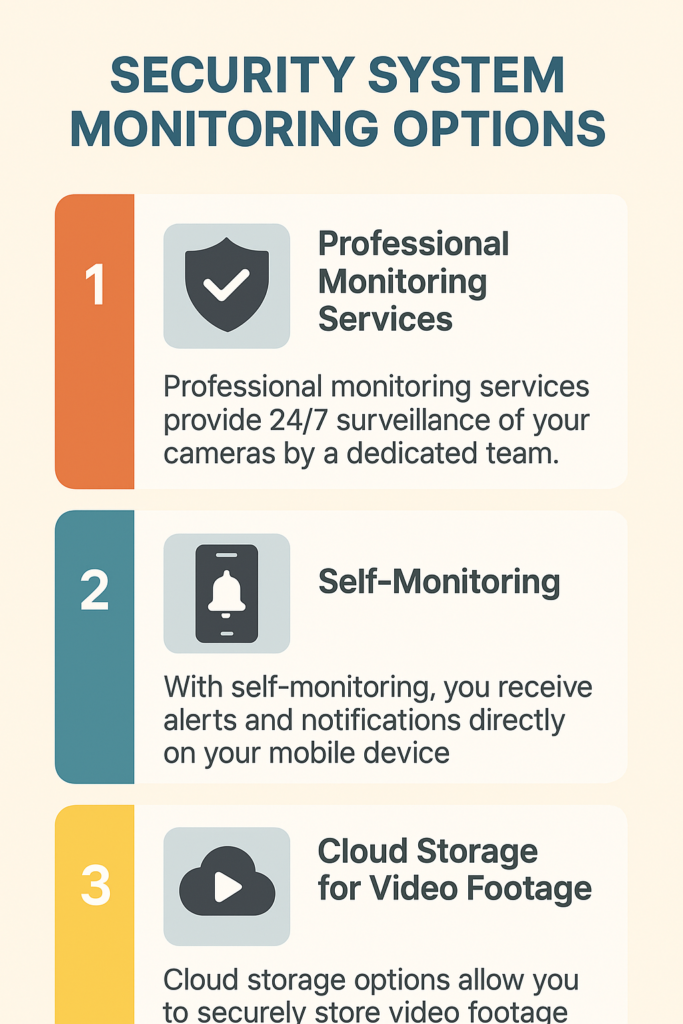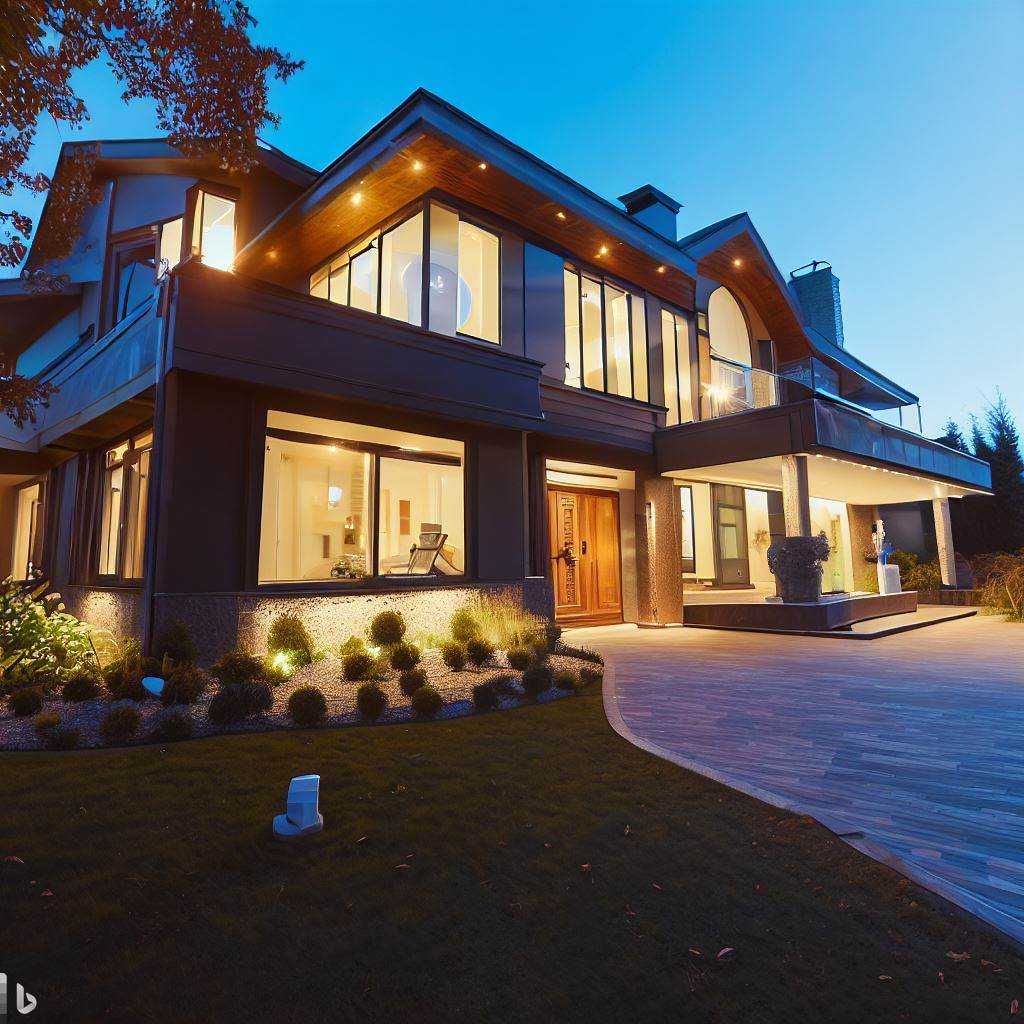What Are Camera Security Systems?
Camera security systems are advanced technological setups that enable homeowners to monitor their property and deter potential intruders. These systems consist of cameras strategically placed around the premises, capturing video footage of activities in and around the house. With the help of these cameras, homeowners can keep a close eye on their property even when they are away, enhancing their homes’ overall safety and security.
Camera security systems are designed to provide real-time monitoring and recording capabilities. They can be wired or wireless, offering different installation options depending on the homeowner’s preferences and requirements. These systems typically include cameras with various features, including high-resolution video capture, night vision, motion detection, and remote access through mobile apps or web interfaces.
Factors to Consider When Choosing a Home Security System with Cameras

When selecting a home security system with cameras, homeowners should consider several crucial factors to make an informed decision that aligns with their specific needs and budget. Here are some key considerations to keep in mind:
1. Budget: Determine the amount you are willing to invest in a home security system. Remember that the cost will encompass the cameras and any additional equipment, installation fees, and ongoing maintenance or monitoring expenses.
2. Coverage Area: Assess the size and layout of your property to determine the number and placement of cameras required for adequate coverage. Consider areas like entry points, outdoor spaces, and critical interior locations.
3. Video Quality: Look for cameras with high-resolution video capture for clear and detailed footage. High-definition (HD) and 4K resolution cameras provide superior image quality, making it easier to identify individuals and events.
4. Connectivity Options: Consider whether you prefer wired or wireless camera systems. Wired systems provide a reliable and consistent connection, while wireless systems offer more flexibility in camera placement and ease of installation.
5. Additional Features: Explore the various features of different camera security systems. These may include motion detection, night vision, two-way audio, facial recognition, and cloud storage options. Assess which features are essential for your specific security needs.
6. User-Friendly Interface: Look for systems with intuitive interfaces and user-friendly mobile apps that allow you to easily access and control your cameras remotely. A well-designed interface simplifies system management and enhances the user experience.
Top Home Security System Brands for Camera Systems
Several top brands have gained recognition for their reliability, advanced features, and customer satisfaction regarding home security systems with cameras. Consider these leading brands when exploring your options:
Arlo
Known for its wire-free security camera systems, Arlo offers a range of high-quality cameras suitable for both indoor and outdoor use. Arlo cameras are known for their ease of installation, wireless capabilities, and advanced features like motion detection, night vision, and two-way audio.
Ring
Now owned by Amazon, Ring offers a comprehensive lineup of home security products, including camera systems. Ring cameras provide HD video quality, wide-angle lenses, motion-activated alerts, and two-way audio. Their systems integrate seamlessly with other Ring devices and can be controlled through the Ring mobile app.
Nest
This subsidiary of Google offers a range of smart home security cameras. Nest cameras feature high-resolution video, advanced motion detection, facial recognition, and mobile alerts. They seamlessly integrate with other Nest products, creating a cohesive smart home security ecosystem.
Lorex
Lorex specializes in wired security camera systems and offers various cameras suitable for various applications. Their cameras provide high-definition video, night vision, and wide-angle lenses for optimal coverage. Lorex systems are known for their durability and reliability.
Hikvision
Hikvision is a leading global provider of video surveillance solutions. Their cameras are widely used in residential and commercial settings and offer advanced features: 4K resolution, pan-tilt-zoom capabilities, and intelligent video analytics. Hikvision provides comprehensive security solutions with a focus on high-quality video surveillance.
Remember to research and compare different brands based on your needs, budget, and desired features. Reading customer reviews and seeking recommendations from trusted sources can also provide valuable insights into the performance and reliability of different camera brands.
DIY or Professional Installation?

DIY installation offers cost savings, flexibility, and control, while professional installation provides convenience, expertise, and peace of mind. Both approaches have advantages and limitations, so weighing them against your specific circumstances and requirements is important.
DIY Installation
One of the primary benefits of DIY installation is cost savings. Homeowners can significantly reduce the expenses of setting up a camera security system by eliminating the need for professional installers. DIY installation kits often come with detailed instructions, making it relatively easy for anyone with basic technical skills to set up the system.
Another advantage is flexibility and control. With DIY installation, homeowners can choose the placement of cameras, ensuring optimal property coverage based on their knowledge of potential vulnerabilities. Additionally, homeowners can customize the system according to their preferences, selecting specific camera models, storage options, and integration with other devices.
DIY installation requires homeowners to invest time and effort in understanding the installation process. This may challenge people with limited technical expertise or busy schedules. DIY systems may not offer professional-level expertise, potentially leading to suboptimal camera placement or system configuration.
Professional Installation
Professional installation offers homeowners the convenience and assurance of having experts handle the entire setup process. Professional installers have the knowledge, experience, and specialized tools required to install the camera security system correctly and efficiently. They can assess the property, recommend optimal camera placements, and ensure the system functions seamlessly.
Moreover, professional installers can help you select the right camera models and system components based on the homeowner’s specific needs and budget. They can also offer valuable advice on maximizing the system’s effectiveness and integrating it with other security measures.
But professional installation costs more. Homeowners should consider their budget and weigh the benefits of professional expertise against the financial investment required. Scheduling appointments and relying on external service providers may also introduce scheduling constraints.
Wired vs. Wireless Camera Systems: Making the Right Choice
When choosing a camera security system for your home, one important decision is whether to opt for a wired or wireless system. Understanding the advantages and limitations of each option will help you make an informed choice that suits your specific needs. Consider the following factors when weighing the pros and cons of wired and wireless camera systems:
Wired Camera Systems
Wired cameras require physical connections between the cameras and the recording or monitoring device. Here are some key points to consider:
1. Reliability: Wired systems provide a stable and reliable connection since they are not susceptible to signal interference or potential Wi-Fi network issues.
2. Power Source: Wired cameras require a direct power source, usually through an electrical outlet or a Power over Ethernet (PoE) connection. This eliminates the need to recharge or replace batteries.
3. Scalability: Wired systems often offer more scalability options, allowing additional cameras to be added without concern for wireless range limitations.
4. Higher Resolution: Wired cameras can support higher video resolutions (4K) since wireless bandwidth constraints do not limit them.
5. Installation Complexity: Installing wired systems typically involves running cables, which may require professional assistance and can be more time-consuming.
Wireless Camera Systems
Wireless systems transmit video and audio signals using Wi-Fi or other wireless technologies. Consider the following aspects when evaluating wireless camera systems:
1. Ease of Installation: Wireless systems are generally easier to install as they eliminate the need for running cables. This makes them suitable for DIY installations.
2. Flexibility and Mobility: Wireless cameras provide greater flexibility in camera placement since physical connections do not bind them. They can be installed where running wires may be challenging or impractical.
3. Wireless Range: Consider the wireless range of the cameras and ensure that it covers the desired areas of your property. Thick walls, long distances, or interference from other devices may affect the wireless signal strength and coverage.
4. Battery Life and Maintenance: Wireless cameras are powered by batteries that require periodic recharging or replacement. Consider the battery life of the cameras and factor in the maintenance required for ongoing operation.
5. Signal Interference: Wireless systems may be susceptible to signal interference from other devices operating on the same frequency. Choosing cameras and a Wi-Fi network that operates on less congested channels is essential.
Ultimately, the choice between wired and wireless camera systems depends on your needs, property layout, and priorities. Consider factors like reliability, installation complexity, scalability, resolution, ease of installation, flexibility, wireless range, battery life, and potential signal interference to determine which option best suits your home security requirements.
Best Camera Types for Home Security: Choosing the Right Fit
When it comes to home security systems with cameras, different types of cameras offer unique features and functionalities. Understanding the various camera types will help you choose the right fit for your security needs. Consider the following camera types commonly used in home security systems:
Bullet
Bullet cameras are compact and cylindrical, making them easy to mount on walls or ceilings. They typically have a fixed focal length and offer a narrow field of view, making them ideal for monitoring specific areas or entrances.
Dome
Dome cameras are characterized by their dome-shaped design. They offer a wider field of view and are suitable for monitoring larger areas. Dome cameras are often used indoors, but weatherproof versions are also available for outdoor use.
PTZ (Pan-Tilt-Zoom)
PTZ cameras can pan, tilt, and zoom, allowing for flexible surveillance coverage. These cameras can be remotely controlled to track movements and zoom in on specific areas of interest. PTZ cameras are ideal for larger properties or locations requiring active monitoring.
Indoor vs. Outdoor Cameras
Consider whether you need cameras specifically designed for indoor or outdoor use. Outdoor cameras are built to withstand various weather conditions and often feature weatherproof housing, infrared night vision, and enhanced durability.
Wide Dynamic Range (WDR) Cameras
WDR cameras are designed to handle challenging lighting conditions, like areas with strong backlighting or high contrast. They capture more details in bright and dark areas, ensuring a balanced and clear image.
Infrared (IR) Cameras
IR cameras have built-in infrared LEDs that allow them to capture video in low-light or complete darkness. These cameras provide night vision capabilities, making them essential for around-the-clock surveillance.
Consider your specific surveillance requirements, like the areas you want to monitor, lighting conditions, and the level of control and flexibility you desire. Depending on your needs, you may choose a combination of camera types to create a comprehensive and effective home security system.
Integration with Smart Home Technology: Enhancing Convenience and Security
Integrating your camera security system with smart home technology can offer enhanced convenience, control, and security for your home. Consider the following aspects when exploring the integration options:
1. Voice Control: Look for camera systems compatible with voice assistants like Amazon Alexa or Google Assistant. This lets you control your cameras and access live video feeds using voice commands.
2. Mobile App Integration: Ensure that the camera system has a user-friendly mobile app that enables you to monitor and control your cameras remotely. Features like real-time alerts, video playback, and customizable settings make your home security experience convenient.
3. Automation and Scenes: Consider the ability to create automation routines or scenes that integrate your camera system with other smart devices. For example, you can set up a scene that turns on outdoor lights and starts recording when motion is detected.
4. Compatibility with Smart Home Devices: Check if the camera system is compatible with other smart home devices, including smart locks, video doorbells, or security systems. Integration allows for a more comprehensive and cohesive smart home security ecosystem.
5. Privacy and Data Security: Ensure the camera system prioritizes privacy and data security. Look for features like end-to-end encryption, two-factor authentication, and secure cloud storage options.
Integrating your camera security system with smart home technology offers the convenience of centralized control, automation capabilities, and the ability to monitor your home from anywhere. Consider your existing smart home devices and choose a camera system that seamlessly integrates with your preferred ecosystem.
Security System Monitoring Options: Ensuring Peace of Mind

Monitoring options play a crucial role in maximizing the effectiveness of your camera security system. Consider the following monitoring options and their benefits:
1. Professional Monitoring Services: Professional monitoring services provide 24/7 surveillance of your cameras by a dedicated team. They can quickly respond to alarms, dispatch emergency services if needed, and provide extra security even when you’re away.
2. Self-Monitoring: With self-monitoring, you receive alerts and notifications directly on your mobile device when motion is detected or an alarm is triggered. You can then assess the situation and take appropriate action. Self-monitoring is often more cost-effective but requires your active involvement.
3. Cloud Storage for Video Footage: Cloud storage options allow you to securely store video footage captured by your cameras. This ensures your footage is safely stored off-site, protecting it from potential theft or damage to your camera system.
Consider your preferences, budget, and desired level of involvement when choosing a monitoring option. Professional monitoring provides round-the-clock surveillance, while self-monitoring offers more control and cost savings. Cloud storage ensures that your valuable footage is securely stored and accessible when needed.
Homeowners looking to upgrade their houses and save money should consider several factors. Understanding the definition of camera security systems and exploring the pros and cons of DIY vs. professional installation helps homeowners make an informed decision. Budget, coverage area, video quality, connectivity options, additional features, and user-friendly interfaces are crucial considerations.
Additionally, exploring reputable brands like Arlo, Ring, Nest, Lorex, and Hikvision helps homeowners find reliable camera systems tailored to their needs. Evaluating the advantages of wired and wireless camera systems and choosing the right camera types for specific surveillance requirements further enhances home security.
Integrating camera systems with smart home technology and exploring options like professional monitoring services, self-monitoring, and cloud storage provide a kind of protection insurance that allows homeowners achieve peace of mind while protecting their property and loved ones.



